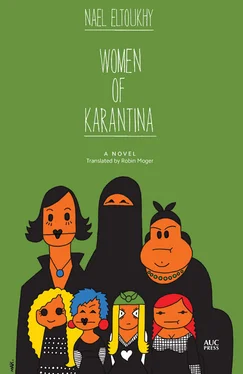Only Lara did not weep. But weeping is not just tears: the heart can weep too. Inside, she was in pieces, just like the other two: Lara, who’d betrayed her sister, then been betrayed by the man she’d betrayed her with. In the days that followed she couldn’t summon the courage to look Yara in the eye. She felt ashamed. She felt very small, as small as small could be, imperceptible to the naked eye. And she did not weep. She didn’t weep until the fifth day.
She watched a scene from an Arabic soap in which the heroine confessed to her lover that she had left him for reasons only God might know and begged his forgiveness, and her lover gave a bitter smile and told her that the body’s sufferings were written in the stars, but who could compel the soul to suffer? Lara wept fiercely. She rocked and slapped her face and screamed, Forgive me, sister. There was no one else at home at the time. It was like she was talking to herself, and certainly she longed for her sister to come in at that very moment and see her in this state, but her sister was far away. No one knew where Yara was.
Lara turned to the tale of Nadia and Itemad, and to the lesson it contained: that women, on their own, can do anything. Given the chance, women can do the impossible. And there was another lesson. One night, Lara decided to cross the line and go and pay Sheikha Salha a visit.
She knocked on the door of the apartment and said, It’s Lara. If you want to spit in my face, go ahead and spit, but I’m so, so tired, and I won’t be at peace until I’ve spoken to you. Sheikha Salha greeted her with a smile. She wafted incense around her and recited I seek refuge with the Lord of the Dawn and I seek refuge with the Lord of Mankind. When she had calmed down a little, Lara sat. She said, I was tired. I’m just a woman and I got tired like women do. And I did wrong, God forgive me. But God bless you, Sheikha, I’m not leaving till you’ve told me something to ease my soul. Sheikh Salha told her something to ease her soul. She told her that she was no different from her sister and Amira. We are all the same before the Lord. This was the second lesson Lara learned.
Lara took herself off to see Afriqi, the man who ran her and Yara’s war down in the tunnel. She set out the details of the plan that had been laid for next Friday: the barriers between the two tunnels would be torn down and everybody would gather down there. Everybody meaning everybody, meaning Lara and Yara and Amira and Yehya Volcano and Afriqi, and even Kama Sutra, Amira’s commander in her section of the tunnel. We’ll defend ourselves with everything we’ve got: hatchets and swords, Molotovs and machine guns. We’re all together now, there’s no differences between us. The young kids will stay up top by the entrance to Karantina. They’ll mine the entrance to the neighborhood. Any vehicle belonging to the Interior will be blown to bits if it comes in. The women will be up on the rooftops with bottles of acid that they’ll chuck at anyone who enters. This tunnel, brother: this’ll be something like a command center. We’ll run the battle from here. I want you to set up a big screen so we can watch what’s happening aboveground. Have you got it, Afriqi?
Afriqi had got it, of course. Afriqi had memorized every detail of the plan. It had already been explained to him by Amira, and before that by Yara, each in a private meeting of their own.
These were the stated details of the plan, the details the three women had agreed on between themselves. In her private meeting, Lara appended some other details. She told Afriqi that she couldn’t take this life any longer. It cheated people, and then they cheated you, like we’re all in some kind of jungle. I’m not better than anyone, and no one’s better than me. The Good Lord says, You are all equal. I want to bring this whole story to an end. I’ve had enough.
Lara’s plan to bring this whole story to an end was a simple one. Afriqi would lay dynamite in the tunnel, a ton of dynamite. Then he’d get out, and when Lara called him on his phone he’d send it all sky-high, and her with it; her, and Amira and Yehya Volcano, and Yara. This would take place after victory over the Interior had been achieved, after the ministry’s trucks had been blown up one by one, and after Afriqi had made sure that the neighborhood was secure and no one would ever dare to attack or destroy it again. Lara leaned against Afriqi. Like she was in a trance. Don’t think I’m happy about all this, she said. Don’t think me and my sister want to kill people and turn them out of their homes. Every single one of us, even Amira, even my mother, God have mercy on her soul, wanted to get out of this story. God hadn’t shown us the way. But he’s showing me now. I want my sister to get out of the mess she’s in, and Amira, too. Amira’s a sister to me, boy, and it’s hard for me to see her like this. Maybe when we die, God will show us mercy. No one knows where God’s mercy will fall. Lara promised him the Karantina building when they were gone. It’ll all be over. No one will be left to inherit anything. I’ll sign over everything I own to you. Afriqi tried patting her on the shoulder, but she swept his hand away and smiled. I’m not crazy, boy. Don’t go thinking I’ve gone crazy. God showed me what to do yesterday, while I was praying for guidance.
What Afriqi did not tell her — out of consideration for her feelings — was that Yara had paid him a visit the day before and made the same request, phrased more or less identically, and nor did he tell her — out of ignorance — that Amira would be paying a visit to her second-in-command Kama Sutra tomorrow, and would make the same request, also phrased more or less identically, nor that he and Kama Sutra would sit down next Friday and confide in one another. Afriqi lit a cigarette and gave it to her. He embraced her and said that everything would go just fine, God willing. And she gave in to his embrace. In his arms, she seemed delicate as a bird.
Sheikha Salha led the women through the Friday prayers.
In his sermon, the sheikh spoke of the importance of sticking to one’s principles in difficult times. He would return to this thought throughout the sermon. This is the hour of holding firm, my brothers. I swear by God, the hour of martyrdom is upon us.
After prayers, Sheikha Salha sat with the women, her formidable spiritual energy pulsing from her eyes. Many things had taken place in the neighborhood, she said. People had hated one another and killed one another and women and children had been put out onto the street as a result. And for what, sisters? Because people did not love each other. Everyone secretly believed that the Lord favored them over everyone else. Now, does God stand for that? Did God tell us anyone is better than anyone else, or did he say that no one is privileged over his brother, that no one is better than anyone? During the lesson, Yara was looking at Lara and Lara was looking at Yara and Amira. On the lips of both lay a smile of contentment and peace. The joint betrayal they had suffered had softened their hearts: the first thought of each of them had not been to revenge themselves on the others for betraying them; their first thought had been to kill themselves. Everyone was equal now. History had proved itself to be just.
Half an hour later the police begin to shout through their bullhorns, calling on all residents to vacate the neighborhood immediately. The neighborhood would be cleared by force. The three women are down in the tunnel, Afriqi and Kama Sutra by their side. Up above, the neighborhood is up in arms. The tear gas trickles down into the dark below, men fall before the squalls of lead, the troopers too. And Afriqi and Kama Sutra direct the women standing on the rooftops: they issue orders, where to throw the bottles of searing acid, where to lob the Molotovs; and they direct the men as well, instruct them how best to provoke the armored vehicles into driving their tank tracks over the mined front lines, and one after the other the vehicles are destroyed. Police officers are snatched and taken into Karantina. We’re sitting pretty. Afriqi looks over at the women and smiles. And they smile back. They watch as the stones fly out toward the troops, blinding them forever. The big screen down in the tunnel shows everything, everything. Better than Al Jazeera, better than CNN.
Читать дальше












